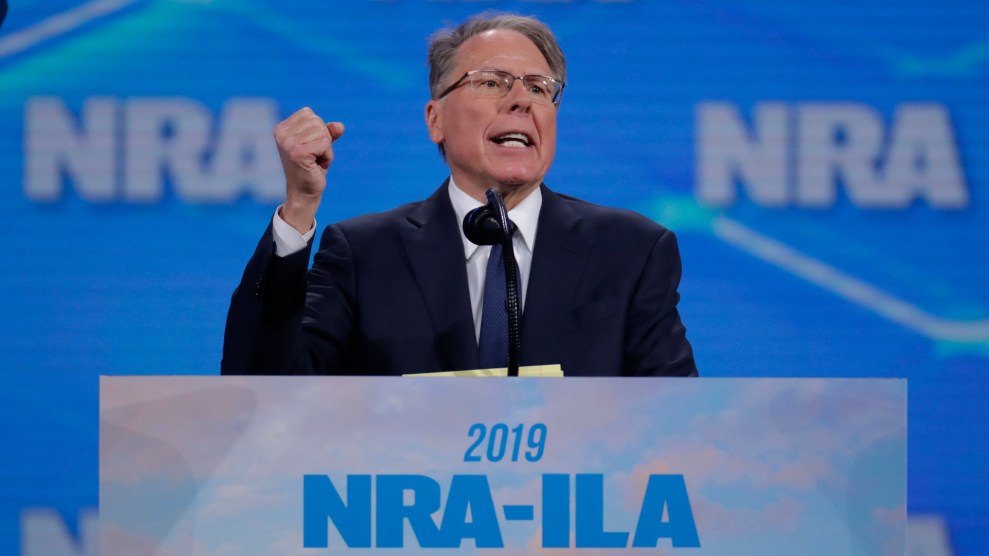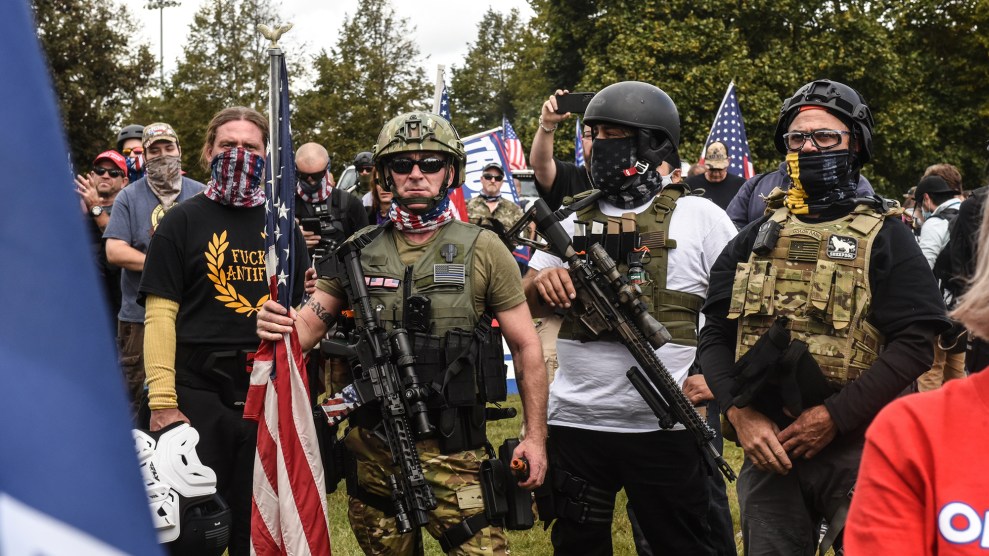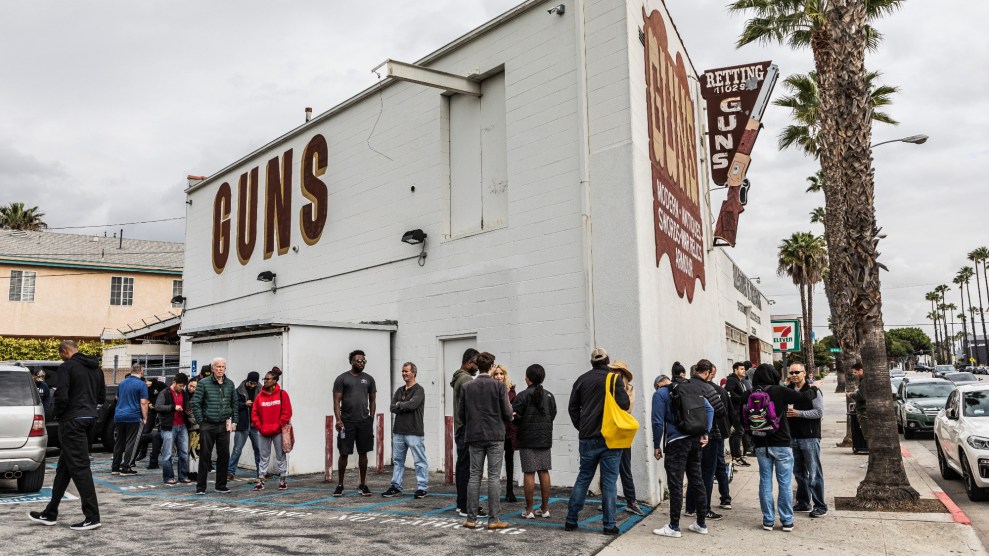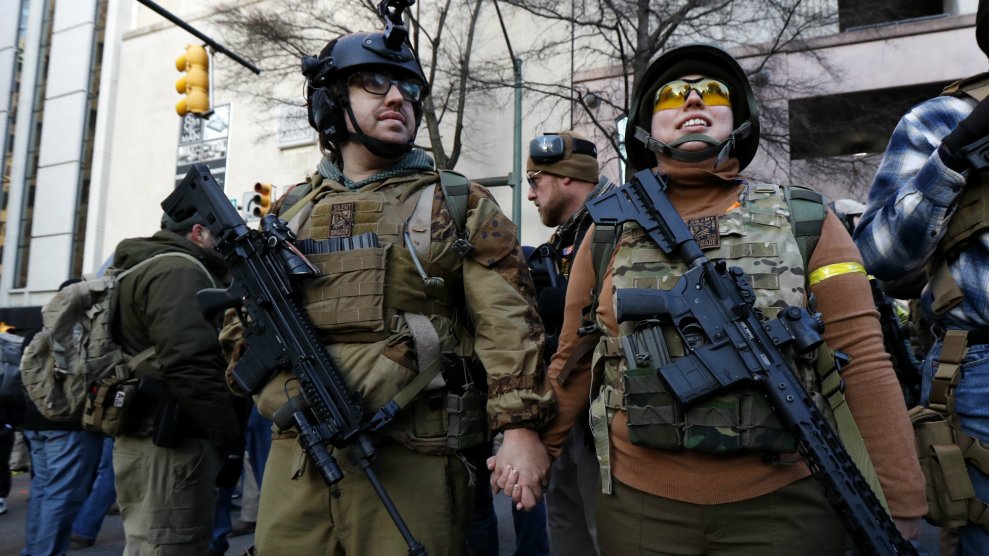In the early moments of the insurrection on Capitol Hill, there was a way to see it as something of a joke—a serious one with important consequences, but still just a bunch of underdressed or over-costumed rubes who wanted to steal souvenirs and take selfies in Nancy Pelosi’s office. As details trickled in, it looked less and less funny. A rioter had been shot and killed by Capitol Police. Others beat an officer who later died of his injuries. Pipe bombs emerged. And photos circulated of a man carrying zip ties, as though he planned to take hostages.
The man, later identified as Eric Gavelek Munchel, was documented by Getty photographer Win McNamee wearing mostly black, a combo of body armor, camo tactical shirt and pants, and a balaclava, looking like a real-life recreation of a video game character from Call of Duty. Also on his head was a cap with the silhouette of an assault rifle laid over an American flag—a hat created by a brand called Black Rifle Coffee Company.
The odds of someone wearing any single brand’s clothing in a viral photograph that could live on in history books is very low. But unlikely as that is, it was not the first time a right-wing alleged lawbreaker went viral while wearing Black Rifle Coffee Company clothing; it wasn’t even the first time in the past year. On November 20, a photo of Kyle Rittenhouse, who in August shot and killed two people and injured one during racial justice protests in Kenosha, Wisconsin, went viral, showing him wearing a Black Rifle Coffee Company T-shirt.
Black Rifle is, at its heart, a coffee company. But unlike the vast majority of coffee companies, it markets its beans with a highly militaristic branding that leans on gun-heavy, special-ops themed photoshoots with goofy product placement. Of course, guns and coffee don’t really have a lot in common. A shooting range session might leave you amped like back-to-back espressos, but that’s about it. One is a liquid and the other is a gun. You drink one, and you fire bullets at over 1,000 miles an hour out of the other. They aren’t even strange bedfellows—they are two separate things that Black Rifle Coffee Company has smashed together.
“It’s really extremely a military—and almost violent—brand identity that’s overlayed with a really bland, domestic category,” according to Aimee Huff, an Oregon State College of Business marketing professor who has researched the relationship between consumers and guns. “Anyone from outside the U.S. would think this is almost insane.”
Correspondingly, Black Rifle’s marketing sometimes feels drawn from a bad Saturday Night Live sketch about gun and coffee fanatics. Their catchphrase is “Fresh Roasted Freedom.” The top of their website recently featured an autoplaying, silent montage of action scenes involving coffee, including slow-motion shots of a sprinting beefy dude in a tight shirt throwing a package of coffee into a moving Baja rally truck, and another showing bullets ripping through bags of beans, interspersed with all-caps text declaring the product is “FOR PEOPLE WHO LOVE AMERICA.”
Judging by the videos’ ironic flourishes, Black Rifle consciously leans into the absurdity; they’re in on the joke. But it’s also utterly unclear where the joke starts and stops. It’s hard to distance yourself from the bit if you are the person you are parodying.
“I think it’s evident that Black Rifle has done a good job honing in on and focusing on a certain group of customers,” says Huff. “They don’t say MAGA, but they do talk about coffee for people who love this country, which is similar language to MAGA. They really support Blue Lives Matter. That’s a really specific group of people they’re appealing to.”
Broad anti–Middle Eastern sentiment, an outgrowth of the global war on terror, has cropped up around Black Rifle. After Starbucks committed in 2017 to hiring 10,000 refugees, Black Rifle responded by saying that it would hire 10,000 veterans. An absurdly racist, xenophobic, and now-deleted Facebook post from the company that was captured in a screenshot shows a picture of armed Palestinian militants as a stand-in for all refugees. (The company didn’t respond to multiple inquires, including a request to comment on the screenshot.) In an October podcast with Joe Rogan, executive vice president Mat Best vented about enemies he’d faced during his military tours who “swore to Allah” and rules of engagement he served under meant to protect civilian life, complaining that he had been involved in “a few instances where you can’t drop ordnance [bombs] on guys you just got ambushed by because the local village said you can’t use bombs from planes.”
The company also supports Blue Lives Matter, a reactionary movement countering the Black Lives Matter civil rights movement. Their “Thin Blue Line” bag of coffee is marketed on their site not with bean origin or tasting notes, but with a blurb telling browsers its “a product created to benefit law enforcement officers and their families,” which, for some customers, is all they need to know.
In 2017, Black Rifle posted a picture of employees with Donald Trump Jr. on Instagram, thanking him for stopping by the company’s booth at what appeared to be a trade show. In an October podcast interview with Rogan, CEO Evan Hafer recalled a dinner he had in Dallas with Steven Crowder, a right-wing online personality, in a tone suggesting a friendship. In 2019, Crowder infamously and homophobically harassed then-Vox journalist Carlos Maza, who was subjected to a torrent of abuse from Crowder’s fans. In late 2020, Crowder promoted the brand by sharing the Rittenhouse photo along with a discount code.
Beyond this gun-friendly politicized community, the brand has proven popular among firearms users and enthusiasts who frequent extreme online gun forums, places like ar15.com, SnipersHide, M4carbine, and 4chan’s weapon’s board /k/, which all skew very right-wing. 4chan’s /k/ weapons board was a key early home for Boogaloo Bois, a group of extremists who anticipate participating in a second civil war. Forums like SnipersHide openly defend Kyle Rittenhouse’s alleged murder of innocent protesters. David Noel, an army veteran and graduate student at Carnegie Mellon who researches gun culture, says that in the decade-plus he’s spent in the ar15.com forums, he’s noticed frequent use of a Thomas Jefferson quote, long popular with armed self-described militia groups: “The tree of liberty must be refreshed from time to time with the blood of patriots and tyrants.”
Noel told me that Munchel’s clothing strongly suggested he had spent time in such communities. “The Kryptek camo pattern is a non-standard pattern that is rarely seen in public but thrived in online gun spaces between 2014-2017,” Noel, who runs an Instagram account devoted to archiving internet gun culture, explained, identifying the exact print on his pants and shirt. “The hard-knuckle gloves, ballistic plate carrier, and BRCC [Black Rifle Coffee Company] hat, all suggest that this person has spent a significant amount of time in online gun spaces.”
The growing popularity of such heavily militarized outfits in this community, Noel says, is a product of the global war on terror, citing a notion developed by Michel Foucault, the mid-20th-century French philosopher, known as Foucault’s boomerang. The theory holds that weapons and tactics of war deployed by colonial powers to repress populations abroad tend to eventually be unleashed domestically. Here, Noel explains, instead of official arms of the state bringing the tools of war home, unaffiliated freelancers have done it themselves. These militarized people tote tactical pants, body armor, and AR-15s practically identical to military models while harassing Black Lives Matter protesters, running military-style checkpoints, attending armed white nationalist training camps, and plotting to undermine election results.
The aesthetic was popularized, Noel says, through post-9/11 video games like Socom US Navy Seals, and Call of Duty’s 2007 installment, Modern Warfare, that mimicked the war on terror–era military and dragged a game genre once dominated by titles set in the 1940s or sci-fi dystopias into contemporary battles. An online community of cosplay and LARPers deeply interested in the real-life weapons depicted in Modern Warfare popped up. Noel says the community made an offline arrival at the deadly 2017 white supremacist rally in Charlottesville. “The Unite the Right Rally was the first time I really started noticing people wearing plate carriers,” he said. “Before you’d see grunge militia guys in camo pants. After that, they started wearing tactical gear. That’s when online started to enter into the real world.”
Black Rifle only sells coffee, brewing equipment, and branded clothing, but has still managed to carve a valued niche in the online gun world. But that position was put at risk in late 2020, when the company quickly issued a public statement distancing itself from Rittenhouse, triggering condemnation from hardened segments of the online gun community. Many decamped to Stocking Mill Coffee, an “even more extreme brand,” according to Noel. “Coffee became this bizarre stomping ground of infighting,” he says.
Stocking Mill, named for a Revolutionary War site, proudly bears a motto of “Arrive violently…but first…coffee.” The company has been endorsed by the Proud Boys, a neo-fascist group with extensive ties to white nationalists, and it has defended Rittenhouse, claiming that he “exercised” his second amendment rights against “domestic terrorists.” The boost the company says it got after embracing Rittenhouse was so large that it claimed it had to hire seven new employees to meet demand largely driven by an exodus from Black Rifle.
That Black Rifle was so quickly abandoned by a segment of its customers helps illustrate how the same buyers had been using their purchases as a conservative culture war tool, a way to fight against a queer and feminist-friendly liberal aesthetic that they see as encroaching and increasingly un-American. Before they were disappointed, with a bag of Black Rifle’s coffee, they felt like they could still be a gun-loving patriot and have good coffee without handing over money to some limp-handshake hipster wimp at some local roaster or politically correct mega-conglomerate. Black Rifle made the point itself: On its Facebook page in 2015, it posted a shooting range target with a bearded, glasses-wearing, bow-tied man in the crosshairs, describing him as a lover or purveyor of “hipster, anti-gun coffee.” There are other brands that play on masculinity and militarism in similar ways. Online retailers sell manly engagement rings. Mission BBQ is a chain restaurant that goes out of its way to infuse barbecue with a patriotic and veteran-driven aesthetic, in case you had any doubts about its inherent Americanness.
While Black Rifle appears to be keenly aware of its role in the culture wars, the company hasn’t issued any statement or public condemnation targeting Munchel as it did with Rittenhouse, an action that antagonized a key component of its customer base. Since the Capitol riot, it did not respond to my multiple requests for comment, nor did it respond to questions from the San Antonio Express-News, where the company maintains an operation.
The personal politics of Black Rifle’s founders are less clear than their brand’s. On the Rogan podcast, Hafer spoke less about guns and more about the ongoing plight of veterans who have been left behind by an inadequate system of post-service care. In addition to occasional donations to Republican politicians, he contributed to Obama’s 2008 campaign and to former Rep. Tulsi Gabbard (D-Hawaii) just before she embarked on a 2020 presidential run. But even if Hafer doesn’t have extreme personal politics, his company has rarely shied from creating a brand that appeals to people who do.

















